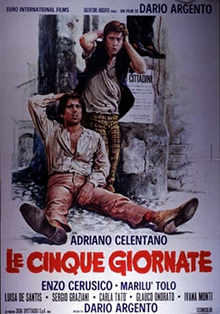Plot
The film is set in Milan during the Five Days of Milan, an anti-Austrian revolt which took place between 18-22 March 1848. A petty criminal, Meo Cainazzo, (played by singer Adriano Celentano) escapes from prison following an artillery bombardment and goes in search of his gang leader Zampino. Along the way he meets and befriends a good-natured Roman baker, Romulus (Enzo Cerusico) who has come are to Milan to help his uncle with work. The pair are involved in a series of tragicomic events: they help to erect a barricade using furniture belonging to a nymphomaniac countess, they help a woman give birth and they are recruited against their will into an ambitious baron, Trazunto's brigade, all while witness the "patriots" violence and the Austrians reprisals. Later, a man denounces his girlfriend as a collaborator, as she is sleeping with a soldier. Baron Trazunto's men swoop down on her and the soldier, killing the soldier, and Trazunto goes to rape the girl. Romulus tries to defend her, and in the fight Trazunto falls down the stairs and dies. Romulus is taken away and shot. Cainazzo is reunited with Zampino, only to discover he had been working with the Austrians, becoming exasperated that the revolution was a lie.
This page is based on this
Wikipedia article Text is available under the
CC BY-SA 4.0 license; additional terms may apply.
Images, videos and audio are available under their respective licenses.
